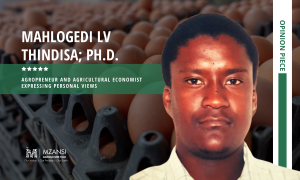Agriculture remains one of the primary sectors identified for employment creation, rural economic development and addressing poverty. However, despite its potential, agriculture is sensitive to environmental (floods, drought and disease) changes and market-related risks. Moreover, lack of access to credit/finance, infrastructure and equipment, knowledge and skills, and extension services limit agriculture’s potential to contribute to job and wealth creation in rural areas. As such, increasing access to finance, especially for small-scale farmers, has always featured prominently on agricultural development agenda.
In South Africa, a variety of institutions such as Land and Agricultural Development Bank, Industrial Development Corporation (IDC), the National Youth Development Agency (NYDA), Small Enterprise Development Agency (SEDA) and National Development Agency (NDA) offer financing opportunities in the form of grants or loans to assist black farmers in being more active in the economy. Various government departments and agencies in collaboration with the private sector also have programs offering assistance, for example, the Micro-Agricultural Financial Institutions of South Africa (MAFISA), Operation Phakisa, Agro-Processing Support Scheme (APSS), Agri-parks and the Land Reform Programme.

Despite these well-intended initiatives, the better life for all remains elusive, and the potential of agriculture remains locked. This is because of other challenges related to access and allocation of agricultural finance, credit risks, and lack of support services such as mentorship, capacity building and skills development. This has led to many projects failing or becoming white elephants once the initial funding is exhausted.
Building capacity of farmers is important to agricultural transformation. Currently, when an institution provides support to farmers, it defines the priorities, controls the budget and manages the entire project. Ownership is often only transferred towards or at project completion. This affects the project’s sustainability and limits capacity development as true ownership, and the accompanying capabilities to manage the investments would still be lacking.

Another challenge, also emanating from well-placed intentions, is the lack of coordination among government departments. More often than not, several government departments would run similar but parallel programs, often within the same areas, with little or no coordination. This creates inefficiencies and usually ends up favouring a few ‘promising stars’ with access to information. Those who are vulnerable often lack access to information, hence remaining outside the “gravy train” entrenching a vicious cycle of poverty.
For agricultural finance to make a lasting impact on farmer livelihoods, efficient public spending is critical. Mainly, using development strategies and financing models that promote agricultural transformation centred around the development of human capacity. The investment in human capital, particularly in rural areas is essential for knowledge dissemination to other community members, improving the general standard of living overtime.
Authors:
- Wendy Geza
PhD student at the University of KwaZulu-Natal. Centre for Transformative Agricultural and Food Systems, School of Agricultural, Earth and Environmental Sciences, University of KwaZulu-Natal, Private Bag X01, Scottsville 3209, Pietermaritzburg, South Africa. Email: wendygeza@gmail.com. / 213501917@stu.ukzn.ac.za - Karen Caister
Lecturer at the University of KwaZulu-Natal: Agricultural Extension and Rural Resource Management, School of Agriculture, Earth and Environmental Sciences. University of Kwa-Zulu Natal, P/Bag x01, Scottsville, 3209. Email: Caister@ukzn.ac.za - Tafadzwa Mabhaudhi
Co-Director: Centre for Transformative Agricultural and Food Systems, School of Agricultural, Earth and Environmental Sciences, University of KwaZulu-Natal, P/Bag X01, Scottsville, 3209, Pietermaritzburg. Tel. 033 260 5442; Email: mabhaudhi@ukzn.ac.za
Further reading:
The full version of this article was originally published in the South African Journal of Agricultural Extension: Geza W, Caister K and Mabhaudhi T. 2020. What is the contribution of agricultural finance to farmer livelihoods? S. Afr. J. Agric. Ext. 48: 126 – 138 http://dx.doi.org/10.17159/2413-3221/2020/v48n2a543




















